NFTs have taken the world by storm. These non-fungible tokens have become quite the tool to tokenize an asset. Although mostly used for tokenizing digital assets right now, there have been examples of physical assets as well. And quite right too. If used to their complete capabilities, NFTs have quite an application for proving ownership of real-world items from deeds to concert tickets.
Naturally, everyone wants a piece of this cake. But whether you want to sell NFTs or buy them, there’s a very important piece of software you’ll need. What’s that, you ask? A crypto wallet, of course.
But as is the case with most NFT related things, the number of wallets out there to choose from is plenty. This sheer volume is enough to drive anyone crazy. It can even sometimes lead them to abandon the whole thing. For that reason, we’ve compiled a list that’ll help you on your quest to choose one.
Why Does an NFT Wallet Matter?
A crypto wallet is your window to the NFT world. It doesn’t just store your cryptocurrency, it also stores your NFTs. Technically, it doesn’t store your NFTs or cryptocurrency. Both of these are stored on the decentralized ledgers, known as the blockchain.
Instead, it provides you with access to your assets on the blockchain. You can easily track all your assets on the blockchain and display them in a single place with your wallet.
A wallet also generates a private key to the address of the asset on the blockchain. This private key is the one that is required to authorize any transaction on that address.
A wallet makes sure that this private key remains secure so that no one else but you can authorize transactions for your assets. Most good wallets provide two-factor authentication to that end. It also provides a nice user interface so you can interact with the blockchain without having to worry about any technical bits. You can easily buy, sell, or transfer NFTs or cryptocurrency with your wallet.
What to Look for in a Wallet?
When looking for a wallet, there are a certain number of factors to consider. Some of these will be universal for everyone, like security. While others will be different for different users. Here’s a rundown of what you can base your choice on.
- Strong Security: Whether your NFTs are worth hundreds of dollars or millions, you want a wallet where they’ll be secure. The most important feature to look out for in a wallet is two-factor authentication. Without two-factor authentication, it’s easier to get access to your wallet and gain access to all your crypto assets. That’s how a lot of people lost their NFTs from the Nifty marketplace; they didn’t enable two-factor authentication for their wallet.
- Support for multiple blockchains: Although the most popular blockchain for NFTs is Ethereum, other blockchains support NFTs too. So, you need to choose a wallet that supports mutiple blockchains or at least the blockchains that you’re interested in to have access to as many NFTs as you want.
- Compatibility with your preferred marketplace: The wallet should also support the marketplaces where you want to buy NFTs from, otherwise you won’t be able to buy the ones you want.
- Friendly user-interface: A wallet acts as the intermediary between you and the blockchain. A user-friendly interface will help make that interaction as smooth as possible so you can buy and sell NFTs without any hassle.
- Cross-device use: If you want the wallet to be available across devices for ease of use, choose a wallet that works both on the desktop as well as a mobile device.
- Credit/ debit card support: One of the features you can look out for in a wallet is whether it supports direct payments from a debit or credit card. Not all wallets offer the feature. So, you need to choose whether you want it from a wallet.
- Bank withdrawal: Another feature to look out for when choosing a wallet is whether you can withdraw funds directly to a bank account.
Types of Wallets
Before going to the part about the top software wallets for NFTs, it’s also important to know the types of wallets available so you know which is the right choice for you.
- Software Wallets: Software wallets are the wallets this list will talk about. This includes wallets that you can either download as a mobile app, desktop app or use in your browser. These wallets are secured by a password, seed phrase and 2-factor authentication in some cases.
Software wallets include mobile apps, browser extensions and desktop apps. Since it’s software, these wallets are a lot more accessible than their counterparts. You can access your funds from mostly anywhere.
These are also considered very secure. Most wallets have a seed phrase to protect your wallet; no one can access your wallet without one. But if you, too, lose your seed phrase, you’ll lose all access to your wallet. There’s no “Forget Password” mechanism that’ll you get you back into the wallet. - Hardware Wallets: These types of wallets are hands-down the most secure wallets out there. Hardware wallet is a physical wallet; it’s a peice of hardware where you store your crypto assets, cryptocurrency and NFTs, offline. The device is protected with a password.
Since your assets aren’t stored online, they’re safe from hacking. These wallets also offer a seed phrase which you can use to get the contents of the wallet back if you ever lose the device.
If you think hardware wallet may be the best fit for you, Trezor or Ledger are some wallets worth checking out.

Finally, it’s time to get to the list of some of the top software wallets out there you could get for your NFT needs.
MetaMask Wallet
MetaMask is undoubtedly one of the most popular crypto wallets currently. It is an Ethereum wallet that you can use to buy or sell NFTs on the Ethereum blockchain on almost all marketplaces. One of the main reasons behind this is that MetaMask works on both your mobile phone and your browser.
You can conveniently sync the wallet in your browser extension and the mobile app to have access to your funds anywhere. The browser extension also makes it a popular choice for NFT traders as you can browse web 3.0 and NFT marketplaces and access them easily from a desktop browser.
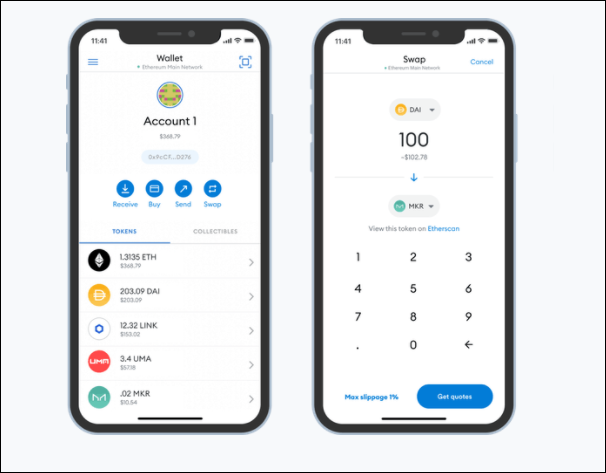
The mobile app also has a dedicated browser for accessing dapps (decentralized applications) and NFT marketplaces.
Metamask also lets users set up multiple addresses. Multiple addresses allow you to store your cryptocurrency and NFTs separately. The interface of the wallet is very user-friendly which makes it easier to use even for beginners.
The wallet also boasts a built-in feature to directly swap your Ethereum tokens. It also lets you switch between different gas prices depending on the type of transaction. The browser extension also supports hardware wallets Trezor and Ledger. It also supports debit cards and bank transfers to buy crypto in over 60 countries.
Coinbase Wallet
A lot of people might already be familiar with Coinbase for its cryptocurrency exchange. It’s one of the largest crypto exchanges out there. The company also offers a non-custodial wallet for your NFT holdings, and just like the cryptocurrency exchange, it’s one of the most trusted wallets. As it’s a non-custodial wallet, users have complete control over the assets in their wallets.
One of the reasons Coinbase is so popular is because it is very beginner-friendly. It is utterly easy to set up and use a Coinbase wallet. What sets it apart from other wallets and makes it so beginner-friendly is the way it uses or rather doesn’t use, addresses. Instead of using public wallet addresses like most wallets out there, Coinbase uses the familiar concept of usernames to facilitate the exchange of NFTs. So, if you find those lengthy wallet addresses too confusing, Coinbase might be the wallet for you.
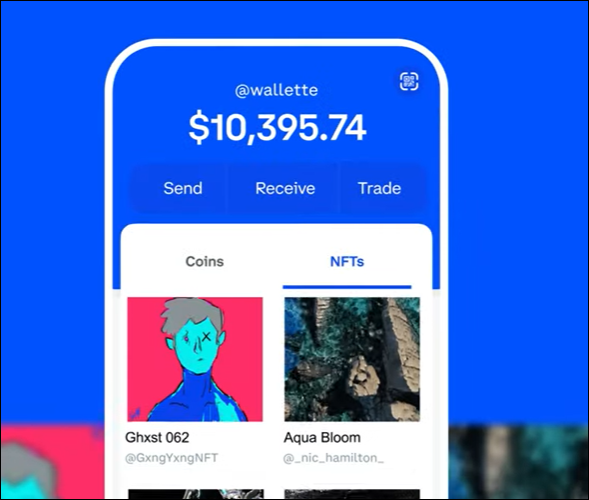
Usernames also provide an additional sense of security as trying to double-check 40-50 letter-long wallet addresses can be overwhelming. With usernames, you can be assured that you’re not sending NFTs to the wrong wallet.
Just like MetaMask, Coinbase also has both browser extension and mobile app. So you can easily browse NFT marketplaces across devices. The mobile app for Coinbase also has a built-in browser to explore NFT marketplaces and dapps on your mobile phone without any issues.
Although Coinbase supports many crypto tokens, when it comes to NFTs, the only standard it supports is still ERC721 NFTs built on the Ethereum blockchain. But given how a vast majority of NFTs are traded on Ethereum, it’s only fitting to have multiple wallet choices for the same.
Coinbase also supports credit or debit card payments in over 90 countries so you can directly buy NFTs. Additionally, the wallet also offers a one-click backup for your private keys. Backing up your private keys on your personal cloud drive helps ensure that you don’t lose access to all your digital assets.
Math Wallet
Another popular alternative for a wallet is the Math wallet. One of its biggest selling points is that it is a multi-chain wallet that supports more than 90 blockchains. Some of the most popular blockchains include Ethereum, Solana, Polygon, Flow, Arweave, and Binance Chain.
With its multi-chain and cross-chain support, Math wallet is the perfect choice for those who don’t want to be limited to a single blockchain.
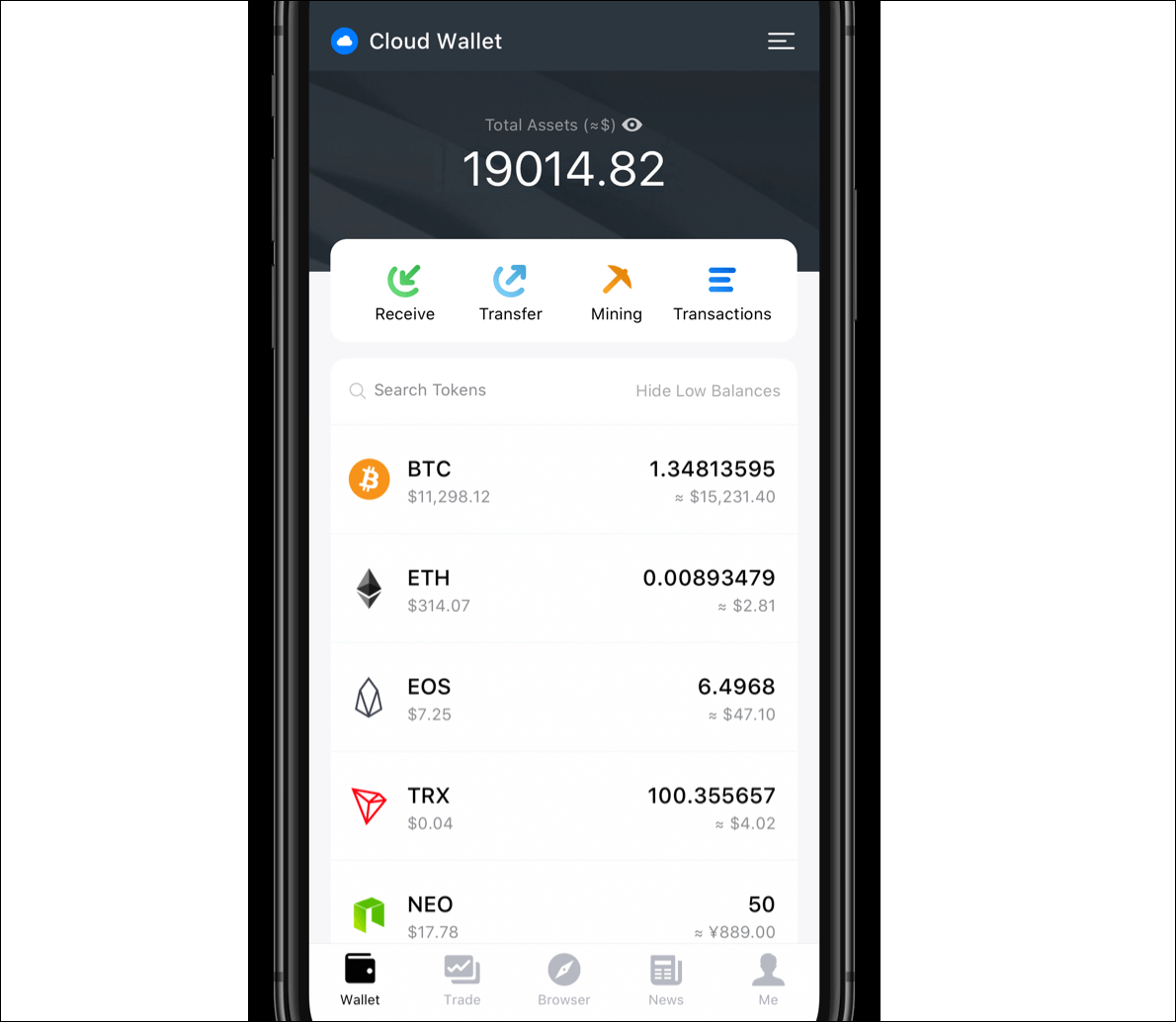
The wallet offers a web, desktop, and mobile version so you can sync your assets across devices and buy or sell NFTs any way you please. The syncing process for your assets across devices is flawless. It also offers integrations with popular hardware wallets like Ledger and Wookong. The integration with hardware wallets
Like MetaMask, it also lets you create multiple addresses so you can keep different crypto assets like cryptocurrency and NFTs separate.
The wallet also supports seamless swapping for tokens within the interface. It also offers other features like staking and its own utility token. The mobile app for the wallet also has a built-in browser for access to dApps and NFT marketplaces.
Enjin Wallet
Another popular choice for a wallet is the Enjin wallet. This one is more suitable for particular needs like the collection of in-game NFTs and other collectibles.
One of its drawbacks is that it only offers a mobile app. But its mobile app offers something unique that you won’t find in other wallets. It boasts a Smart Crypto Wallet UI. The Smart UI evolves as you use the app so it can better cater to your needs. This makes it one of the best wallets out there for storing and displaying your NFT collection.
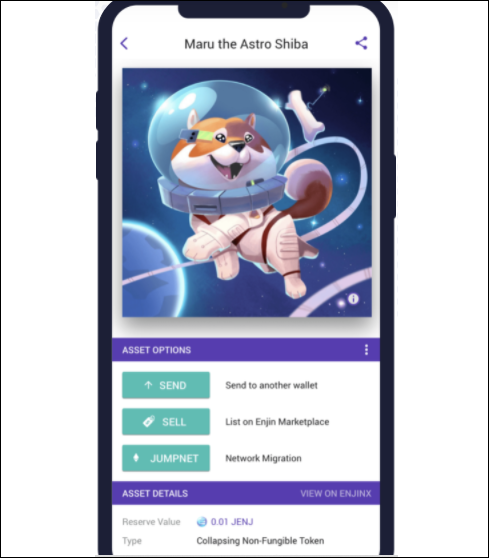
The mobile app also features an in-built browser to run decentralized apps on the Ethereum blockchain. Users can browse NFT marketplaces or DeFi apps with just a single click from the app.
It is also one of the most secure software wallets out there, with its security almost parallel to a hardware wallet.
Although there are many tokens supported for cryptocurrency, but when it comes to an NFT standard, it only supports the ERC-721 and ERC-1155 tokens (on the Ethereum blockchain).
Enjin is not just a wallet that you can use to only store and trade NFTs. It also has its own marketplace, where you can mint, sell and buy NFTS of all sorts. But you need the native crypto token ENJ, to trade on the marketplace. Curiously, one of the other factors that set it apart from other wallets is the reliable customer support service it offers.
Alpha Wallet
Alpha is another outstanding choice as an NFT wallet. It’s an open-source wallet but it only supports the Etehreum blockchain currently.
Another one of its drawbacks is that it only has a mobile app. But what makes it stand out as an NFT wallet is that it supports blockchain games and NFTs natively. In fact, it has a dedicated section within the wallet for NFTs and gaming assets.
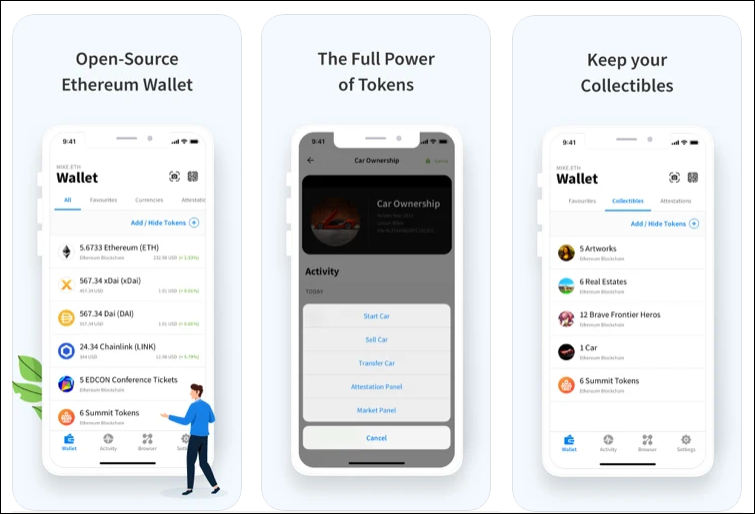
Like most mobile wallets, it also has a built-in browser for exploring NFT marketplaces and other DApps. It also has an option for creating and minting NFTs. The wallet also works directly with apps like CryptoKitties, OpenSea, Dragonoreum, and ChainZ Arena, among other NFT marketplaces. It is compatible with most in-game assets on the Ethereum blockchain.
And while it’s only available as a mobile app, the website does provide a lot of open-source tools that are there to help creators, businesses, and developers as well.
The wallet is also very beginner-friendly with an easy-to-navigate interface. It even allows users to add meta tags to their NFTs. The meta tags make it eerily easy to filter and search through your NFT collection when browsing it.
Trust Wallet
Trust is one of the most popular wallets on the Binance Smart Chain, the rival to the Ethereum blockchain. Still, it’s a multi-chain wallet and also supports the Ethereum and Solana blockchains among others. There’s support for more than 50 blockchains.
But seeing as it’s owned by Binance, it’s more biased towards the tokens on the Binance Smart Chain. This makes it the perfect choice for trading or collecting NFTs on BSC since you don’t even have to set it up for BEP tokens.
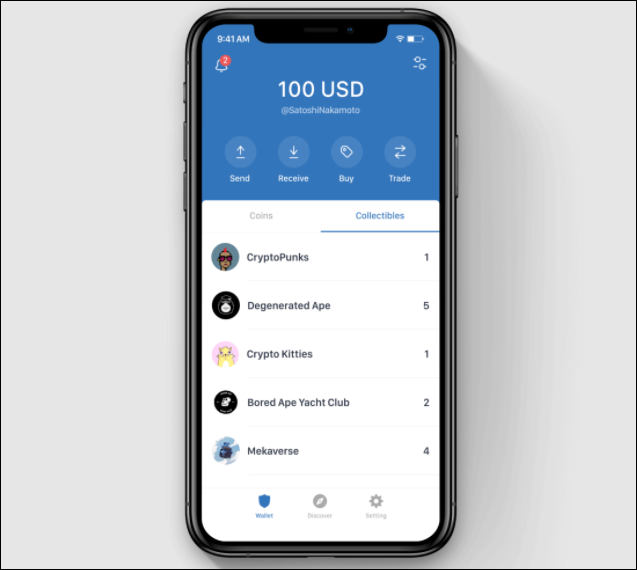
The wallet is only available as a mobile app on Android and Apple app stores. It includes a dApp browser to facilitate easy browsing of NFT marketplaces and other dApps on mobile devices. Users can access marketplaces like OpenSea, Axie Infinity, MyCrypto Heroes, etc. with a single click.
Curiously, the Trust wallet does not allow you to transfer NFTs. You can only use it to store and manage your assets. The UI for displaying your NFT collection is top-notch. It also supports other features like token swapping with a built-in cryptocurrency exchange. Users can also use their credit or debit cards to buy tokens.
Now, choosing a wallet would depend on your personal requirements. There are a lot of factors at play here, like whether you’re a creator or a collector, and what kind of device you have at your disposal. Depending on your needs, you can choose one of the wallets from the list.

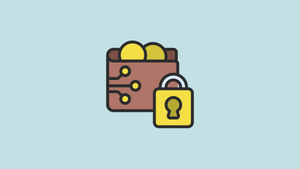


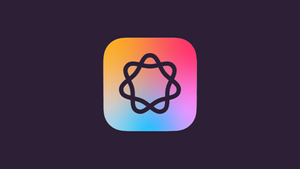
Member discussion